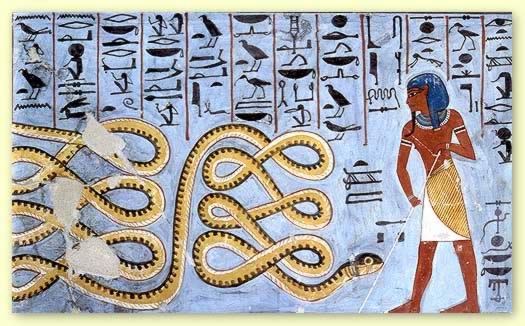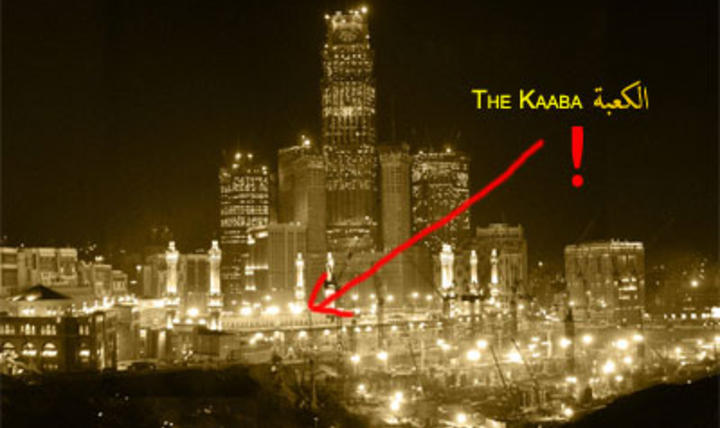
 | The Xenophile Historian |
THE HOLY BOOK OF UNIVERSAL TRUTHS,
K. U. P.
(Kimball's Unauthorized Perversion)
Who were the Amalekites? The only thing Bible scholars agree on is that they were originally an Arabian tribe. I've seen maps that show where the twelve tribes of Israel settled, in the period between 1400 and 1000 B.C., and the word "Amalekites" is written across the nearest part of the Sinai peninsula, right below the land that went to the tribe of Simeon. Before that time, however, they came from somewhere to the east, most likely from the part of Arabia around Mecca. Genesis 36:12-16 mentions a grandson of Esau named Amalek, and for most Bible scholars that's enough to call the Amalekites descendants of Esau, but the Amalekites are also casually mentioned in the so-called "battle of the kings" (Genesis 14:7), so they must have existed as a nation at least four generations earlier. Abulfeda, a thirteenth-century Arab scholar, asserted that Lud, Noah's grandson through Shem, had four sons named Pharis, Djordjan, Tasm, and Amalek, while other Moslem scholars have given Amalek a Hamitic ancestry; either of these cases is more likely than the Esau connection.
The next time the Amalekites appear is in Exodus 17. There we see them coming out of Arabia while the Israelites are coming out of Egypt, and they cruelly attacked the Israelites near Mt. Sinai. Joshua led the armed force that defended the Israelites, while Moses, Aaron and Hur prayed for God's intervention from a nearby hill. In the end they won and Amalek was defeated, but because the Israelite camp had mostly women, children and animals in it, who were still recovering after their flight from Egypt, the battle left a really bad impression on the victors; nowadays we would call it an act of terrorism. For this reason God declared unending warfare against the children of Amalek, a punishment not given to the Philistines or any other enemies of Israel. Additional insight comes from the original Hebrew version of the story, which has a line that doesn't appear in English Bibles: "A hand is lifted up upon the throne of Jah (God)." This means God saw the Amalekites not only as a threat to Israel, but as a challenge to His own authority, meaning that Satan was behind the attack.
After the battle, the Amalekites went on into Egypt, which they conquered easily because Egypt had been wasted by the plagues, and because most of the Egyptian army had recently drowned in the Red Sea. The latter probably included Pharaoh. Don't believe the scene in "The Ten Commandments" where Yul Brynner stops at the Red Sea shore, says that slaughtering the Israelites is a job only fit for butchers, and lets the army go on without him. Later on, pharaohs like Thutmose III and Ramses II would insist on always being in the front of their armies, so why would it be different here? Anyway, in Egypt the Amalekites became known as the Hyksos (foreign kings or shepherd kings), and they terrorized the Egyptians for at least a century.
Once in Egypt, the Hyksos/Amalekites took to worshipping Set, the villain in Egyptian mythology, but they also had a god of their own, a fiery serpent called Apep (Apophis in Greek). According to the mythology the Egyptians developed, the sun-god Ra had to fight and defeat Apep every night, in order to rise in the morning, and Apep's ultimate goal was to devour everything in the universe. Compared to the terrifying Apep, Set looked like a good guy; Set may have pulled some dirty tricks on Osiris and Horus, but at least he played by the rules of kingship. Another myth talked about a war between the gods, and in this one, even Set joined most of the other gods to vanquish Apep. Of course none of this endeared the Amalekites to their Egyptian subjects.
(Note: While writing this, I learned that astronomers are concerned about a recently discovered asteroid, which could hit the earth in 2036. They named the asteroid Apophis. How fitting.)

Apophis the serpent, here challenging Ramses I.

Apophis the Hyksos pharaoh.

Apophis the TV villain (from "Stargate: SG-1").

Apophis the asteroid.
For years I thought that was the end of the story, and that the Amalekites were extinct. But what if they didn't die out? God promised to make war upon Amalek "from generation to generation"; does that mean the Amalekites are still around today? Since they came from Arabia, could the Saudis be their descendants? I am beginning to think so; their vicious anti-Semitism suggests that the Saudis are descended from Amalek in a spiritual sense, if not a physical one. Even the Arabic name for Saudi Arabia hints of it: Al-Mamlakah Arabiya al-Saudia. I know "Al-Mamlakah" means "the kingdom" in Arabic, but it also sounds like "Amalek." Is that just a coincidence of language?
Now if there really is a nation ruled by Satan's chosen people, what would be its characteristics? In Chapter 12 of "The Genesis Chronicles," I looked for customs of the Babel civilization in the customs of post-Babel cultures, so permit me to engage in speculation like that here. I would expect the most Satanic of nations to be both anti-Jewish and anti-Christian, and because the Jews have survived as a distinct people for more than 2,000 years without a land of their own, I would expect a Satanic culture to be dysfunctional, containing more than one element that prevents long-term survival. As for what makes up a dysfunctional culture, in 2002 I read a column by Jonathan Rauch that listed the likely characteristics of one. They are items #1-6 in the list below, and are followed by two that I added from my own observations:

There are often times--in sports, the workplace and politics--when somebody is on your side and you wish he wasn't. We have a case of that with the Saudis in the War on Terror. Officially they have been allies of the West as far back as World War I, if you count the subsidy the British gave to Ibn Saud. They called on the Americans to defend them against Saddam Hussein in 1990, but always acted afterwards like it was a mistake; even the presence of Christmas trees in American military camps made them nervous. Since then they have worked against us; Saudis, and not Iraqis, now make up the largest nationality among the "insurgents" fighting in Iraq. Somebody needs to tell the president that; he also needs a reminder that fifteen of the nineteen September 11 hijackers were Saudis, because he's treating the Saudis far too nicely. Besides not supporting us in the current war, they support anyone trying to destroy Israel, and they don't want us to make any change in our energy policy that reduces our dependence on foreign oil. On top of that, the Saudi media routinely publishes crude, anti-Semitic editorials (this is a government-controlled press, don't forget), the government denies anything resembling equal rights for women and anyone who isn't a Sunni Moslem, and as much as 80% of the funding of mosques and Moslem schools in Europe and the Americas comes from the Saudis; the latter may explain why so many American Moslems have a hard time rejecting Islamic extremism. Since the 1980s, I have felt that no ally treats us as badly as Saudi Arabia.
The reason for this strange love-hate relationship between Saudi Arabia and the West is a simple one: oil. Therefore, in order to force an accounting of Saudi behavior, we'll have to wean our economy from Saudi oil; this may also be necessary to win the war against terrorism. Doing that will require a crash program, you may even want to call it a second "Manhattan Project," to achieve energy independence. When we no longer need Saudi oil, we'll be in a better position to pressure Saudi Arabia to stop funding suicide bombings in Israel, Iraq, or anywhere else. It's also time we told them they won't be allowed to finance mosques in the West, at least until they show some tolerance for Christianity; there is no place in today's world for the decree of Mohammed against other religions existing in Arabia.
Dysfunctional cultures can last for a while by isolating their citizens and demonizing the outside world, as North Korea has done, but because they practice anti-survival techniques, like using their children as cannon fodder, they eventually fail, and because they are heavily armed, they tend to take a lot of people with them when they go down. Thus, you could think of them as the social equivalent of a wounded predator, which can be more dangerous than a healthy animal of the same species. In the case of Germany, it took World War II, followed by a complete reconstruction of society, before Germany could become a respectable member of the world community again. Therefore we can expect Islamist societies to collapse; the tricky part will be to manage their self-destruction without igniting a devastating war that could engulf many nations.
There is a line in the Talmud that reads: "There is no beauty like Jerusalem, no wealth like Rome, no magic like Egypt, no depravity like Arabia." That was written in the third century A.D., a full three hundred years before Mohammed. From what we know of the pre-Islamic Arabs, their worst sins were female infanticide and the worship of rocks. The author of that quote was probably thinking of the wicked city of Ubar, in what is now Oman, but today it seems more relevant than ever.
Support this site!